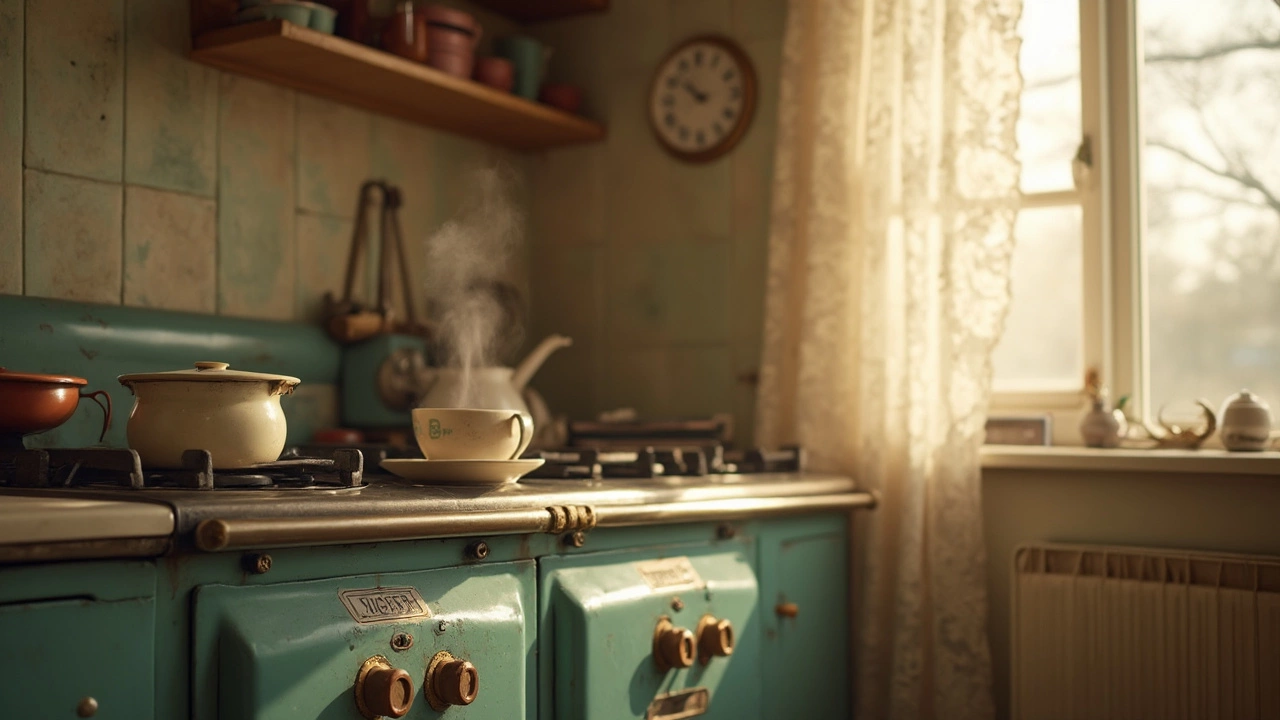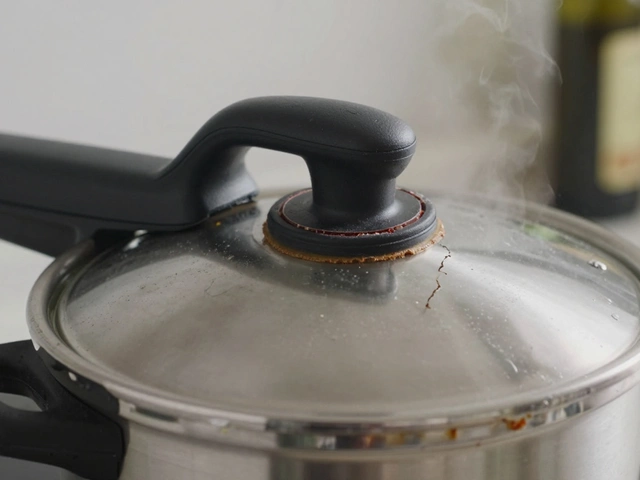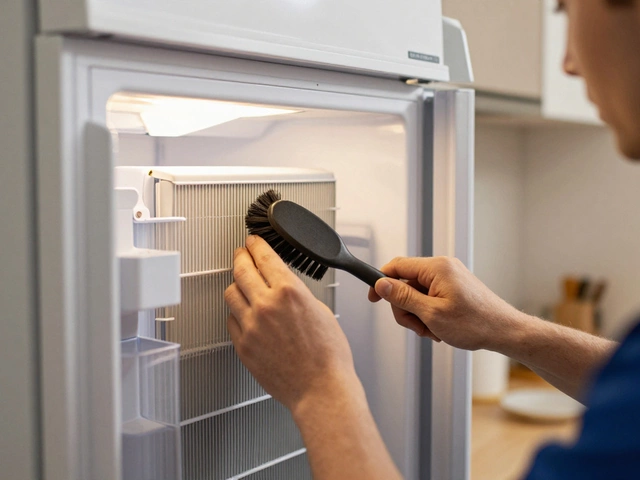Alright, so your cooker's been acting up lately. The scrambled eggs take ages, and dinner's a guessing game with those temperatures. You're probably wondering if it's time for a new one or if a quick fix will do. Honestly, the decision to replace goes beyond how often you burn your toast.
Most cookers last about 10-15 years, but that's a ballpark figure. Gas stoves might live longer than their electric cousins if treated gently. But it's not just age; think efficiency and cost. A new cooker could save you dollars on those power bills, especially with the smart ones getting all energy-efficient these days.
- Signs Your Cooker Needs Replacement
- The Lifespan of Different Cooker Types
- Efficiency and Energy Costs
- When to Repair Instead of Replace
- Safety Concerns You Shouldn't Ignore
- Managing Costs and Making Decisions
Signs Your Cooker Needs Replacement
Your cooker has been your trusty kitchen sidekick, but like all good things, it might be nearing the end of its culinary journey. How can you tell if it's time to bid it farewell? Check out these tell-tale signs.
Inconsistent Cooking Temperatures: If your meals come out half-baked or overcooked, despite the same settings, your cooker's thermostat or internal heating elements might be out of whack. Sure, the odd burnt pizza is forgivable, but constant surprises aren’t what you signed up for.
Frequent Repairs: Remember the last time you had that repair guy over? If it's happening more often than you're comfortable with, those repair costs might soon rival the price of a new appliance. It could be cheaper in the long run to invest in a new cooker.
Rising Energy Bills: An older cooker might be burning through your power bill faster than it does your meals. Check your recent bills—if you see a jump, your old trusty friend might be losing efficiency. A new model could cook better and save you money.
Obsolete Parts: Finding spare parts for that decade-old cooker is a challenge. If hunting down bits and pieces feels like a detective mission, replacement might be your next step.
Safety Concerns: Gas leaks, electrical faults, and unstable flames scream danger. Safety should always come first. No pudding is worth a kitchen accident—consider a new cooker if danger lurks.
Weighing these signs and how they impact your wallet and safety can guide your choice. Remember, your peace of mind is just as important as a perfectly cooked meal.
The Lifespan of Different Cooker Types
When it comes to how long cookers hang around in your kitchen, not all are cut from the same cloth. The type of cooker you've got plays a massive role in its lifespan. Gas cookers, for instance, generally last longer, typically around 15-20 years. They’ve got fewer moving parts and rely on good old flames, which means less wear and tear over time. Just keep those burners clean and you're golden.
Electric cookers, on the other hand, might check out a bit earlier, usually lasting around 13-15 years. The heating elements and the digital displays can sometimes wear out quicker. However, take good care of them, and they’ll surprise you with their endurance.
Then we’ve got induction cookers, the new kids on the block. They're generally expected to last about 10-15 years. They’re energy-efficient, so if you're into saving on the power bill, that’s a bonus during their life span. But keep in mind, they're a bit pricier up front.
If you're thinking long-term, consider what fits your lifestyle and cooking routine. Each type has its perks and quirks. Is it worth the splurge for a snazzier model, or are you more of a basics-get-the-job-done kind of person? It's a toss-up between your cooking needs and your budget.
Efficiency and Energy Costs
If your cooker is guzzling power at an alarming rate, it might be time to rethink your kitchen setup. Older cookers, especially those over ten years old, typically lag behind when it comes to energy efficiency. Not only does this lead to higher electricity bills, but it also means you're not getting the cooking performance you deserve.
Newer models of cookers are designed with energy-saving features that are kinder to both the planet and your wallet. For instance, induction cooktops, while initially pricy, can heat pots faster and lose less heat compared to traditional gas or electric cookers. This means you can get your pasta boiling in no time while using less power.
Curious about how much you could save on energy costs? Here's something to chew on: a new cooker might shave off about 10-20% from your annual energy consumption. That's not small change when you think about how often you cook. Plus, many modern cookers have smart features, like programmable timers and sensors, making them even more efficient.
Below is a quick comparison of energy uses between the three main cooker types:
| Cooker Type | Energy Efficiency |
|---|---|
| Gas Cooker | Moderate, but great for instant control |
| Electric Coil | Least efficient, loses more heat |
| Induction | Most efficient, less heat loss |
When considering a cooker replacement, don't just focus on upfront costs. Think long-term savings. A more efficient model might pay for itself with reduced energy costs over time. Plus, with energy rates always sneaking up, every kilowatt-hour counts!

When to Repair Instead of Replace
Sometimes a full-on replacement isn't necessary at all! Before you ditch your cooker, consider these situations where a repair might do the trick. If parts are still working or it's not too ancient, fixing it could be a smart move.
First, think about the repair costs versus replacement. A good rule of thumb is if the repair costs are less than half the price of a new cooker, a fix makes sense. Especially if your cooker has been otherwise reliable over the years. Basic issues like a faulty heating element or a worn-out knob are often inexpensive to sort out.
"Most issues with cookers can be fixed with a little know-how and the right part. If you're handy enough, a repair can extend your application's life by several years," advises Hamish Tui, a kitchen appliance guru from Appliance World.
The availability of parts is another consideration. Older models might be harder to fix simply because the parts aren’t made anymore. But for the ones still kicking around, there's usually a way to keep them going.
Finally, look at the impact on your energy bills. If your appliance is already energy-efficient or can be improved with a repair, you'll save more money in the long run—on both the repair and your monthly costs.
| Consideration | Repair | Replacement |
|---|---|---|
| Cost | Less than 50% of new cooker price | High upfront cost |
| Parts Availability | Available and affordable | Not a concern |
| Energy Efficiency | Can be improved with repair | Often higher with a new model |
Choosing to repair instead of replace isn't about being cheap—it's smart. Weighing these factors helps keep both your kitchen running well and your wallet in check.
Safety Concerns You Shouldn't Ignore
Kitchen safety is no joke, especially when it comes to your trusty cooker. A lot can go wrong, and sometimes it’s not just an inconvenience but a real hazard waiting to happen. If your appliance is nearing the end of its lifespan, you’ve got to be more vigilant about potential dangers.
The most obvious red flag is a gas leak, which can be incredibly dangerous. If you ever catch a whiff of gas, turn off the cooker immediately and call a professional. Don’t attempt to fix this yourself. Safety first, folks! As chef and safety expert Jamie Oliver once wisely said,
“You don’t mess with gas. Call in the pros and keep your home safe.”
If you notice any weird electrical malfunctions, like sparks or frequent tripping of the circuit, it’s time to put on those brakes and reassess. Faulty wiring can lead to fires, and that’s a risk not worth taking.
Old cookers might also have worn-out insulation, which can cause parts to overheat. This isn't just about burning your food—it could potentially ignite a whole different kind of fire. Regular checks by a licensed technician can mitigate this risk.
- Check for gas leaks: That rotten egg smell is a tell-tale sign.
- Watch out for electrical issues: Flickering lights or tripping breakers? Time to investigate.
- Inspect for overheating: Look for scorch marks or plastic melting near the stove.
Keeping an eye on these safety concerns and acting quickly can save you from a nightmare. Always prioritize your and your family's safety when thinking about whether to repair or replace that old cooker.
Managing Costs and Making Decisions
So here we are, crunching numbers to figure out if sticking with your old cooker or splurging on a new one is the smarter move. To start, let’s chat about what’s in your wallet, basically budgeting.
Replacing a cooker isn't totally a decision you want to make lightly. Sure, there’s an upfront cost, but think about the efficiency and energy costs of your current cooker. Older models can guzzle power faster than a uni student at a free-food event, and that definitely hits your utility bills hard.
| Option | Pros | Cons |
|---|---|---|
| Repair | Less upfront cost, Keeps familiar appliance | Might not solve all issues, Can be temporary fix |
| Replace | Improved efficiency, New features | Higher initial cost, Learning curve with new tech |
Before you decide, it’s wise to get a quote. Sometimes, a repair seems cheaper until the parts and labor add up to more than a decent, reliable replacement. Plus, new cookers usually come with warranties, giving you peace of mind for a solid few years.
Here's a neat trick: do the math over a few years. Calculate what constant repairs might cost versus buying a new cooker. And hey, don't forget to factor in potential savings on your energy bills with a more efficient model. Kitchens aren't exactly cheap to run, ya know?
Finally, look at your lifestyle. If you’re cooking gourmet meals or hosting dinner parties every weekend, investing in a high-quality cooker could be worth it. But, if takeout is your usual dinner menu, maybe that hefty appliance isn’t as necessary. Weigh your options, think about what fits your day-to-day life, and make the decision that feels right for both your kitchen and your budget.




